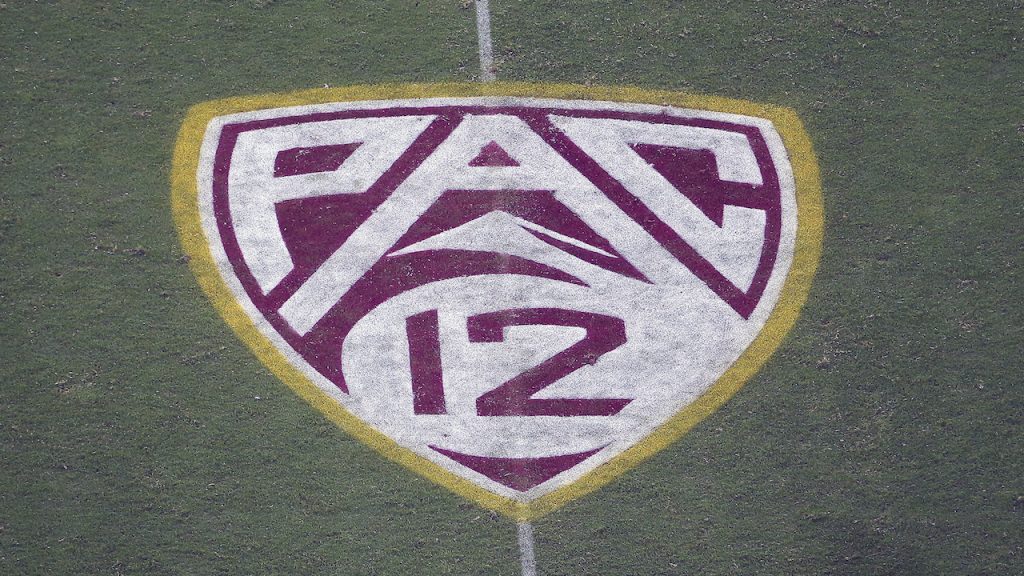Story by Jon Wilner
A few minutes past 10 a.m. on Monday, the Pac-12 released the start times and TV assignments for games on Sept. 25, the fourth week of the season and the first full Saturday of intra-conference play.
The lineup was the result of the first weekly “draft” of games orchestrated by ESPN and Fox, and it brought the expected anguish and outrage across social media.
Why are there no games on broadcast television?
Why are all the games either on the Pac-12 Networks or at night on cable?
Why would ESPN want Oregon-Arizona for 7:30 p.m? (Arizona State will host Colorado at 7:30pm on ESPN2)
There is no easy answer for any single decision. For the betterment of the Pac-12 football brand, it makes zero sense for the UCLA-Stanford game — the Bruins are No. 13 in the AP poll; the Cardinal just beat USC — to be shown on the Pac-12 Networks, which have an extremely limited audience.
But the schedules are based on longstanding contracts and entrenched programming strategies. Pac-12 games are pieces on a giant chessboard designed and operated by ESPN and Fox executives, whose priorities aren’t always in lockstep with those of the conference or the teams.
“The big boards have games sliding up and down,” said Dustin Rocke, the Pac-12’s associate commissioner for broadcast and media administration. “There is a lot of movement behind the scenes.”
The process of determining which games are on which networks at which times typically begins in January, when ESPN and Fox gather as much information about the upcoming season as possible. Out of that comes a massive database with all the games for each of the 10 conferences.
The networks determine the weekly selection order within each league. In the case of the Pac-12, the only conference with an independent network, ESPN and Fox take contractual obligations with the Pac-12 Networks into account (more on that below).
In late May or early June, the kickoff times for the first three weeks of the season, plus the so-called special date games (Thursdays or Fridays), are announced.
At that point, the process takes a hiatus until the season begins. Once the results start rolling in, the programming executives evaluate the value of any given upcoming game.
Rocke holds daily conversations with all three network partners, but at the heart of the process lies an unavoidable conflict:
ESPN and Fox are motivated to show the best matchups in the most desirable broadcast windows each week — to drive ratings — but their plans don’t always serve the best interest of the participating teams, the fans or the conference.
The contracts signed a decade ago, which generate hundreds of millions of dollars per year for the conference, provide the framework.
And they probably won’t change until the 2024 season, when a new contract cycle kicks in.
“We anticipate as best we can,” Rocke said. “In instances when one team has a bad start time, we help where we can on the margins.”
The weekly drafts begin on the second Monday of the season — today — with decisions made for games on the fourth Saturday. (In this case, Sept. 25.)
Whichever network has the first pick in a given week will send an email to the other two networks and the Pac-12 office.
The emails are fairly formal in tone, akin to selections at the NFL or NBA Draft.
“With No. 1 pick, ESPN selects …”
If all goes well, the draft concludes by 9 a.m. PT, and the conference begins alerting the schools.
Because of contractual obligations, the Pac-12 is not at liberty to disclose the weekly selection orders or other details of the process.
However, based on Hotline research into the topic over the years, which includes interviews with Rocke and his predecessor, Duane Lindberg, we know the following:
— Before weekly selections are made, ESPN and Fox receive four priority picks (two each).
Examples of the priority picks would be a major intersectional matchups (i.e., LSU-UCLA), the Stanford/USC home game against Notre Dame or an anticipated conference rivalry (Oregon-Washington or USC-UCLA, for example).
Those four games are removed from the weekly selection pool.
— ESPN and Fox typically picks the games 12 days in advance — two Mondays before the Saturday in question.
However, each network has the option to use a six-day selection (the Sunday before kickoff) twice per season.
That doesn’t mean all the six-day options will be used, because it’s more expensive for the networks to wait until the week of the game to set their plans.
In a typical season, ESPN and Fox preserve the six-day windows for later in the season, when the contenders have emerged.
The Pac-12 isn’t alone in this regard. The network use the six- and 12-day process with other conferences, as well.
“It’s part of the recent history of college football on TV,” Rocke said. “Most college football games across the nation are subject to six- or 12-day selection.”
— The desire to create exclusivity for the marquee games on ESPN/ABC and FOX, which can lead to a glut of games in other windows, has diminished over the years.
“The Pac-12 worked with ESPN and Fox to relax the parameters around the exclusive windows which had previously forced some games into later time slots,” Rocke explained.
“The intent is to avoid going head-to-head, but some overlap is OK.”
— The Pac-12 Networks have the No. 1 pick in the weekly draft once each season, the No. 2 pick four times and the No. 3 pick five times.
However, the week of the No. 1 pick is subject to the four “priority selections” owned by ESPN and Fox, so it could be the second-biggest game of that Saturday.
(The conference declined to disclose which week the Pac-12 Networks have the No. 1 pick.)
— The number of times a team must appear on the Pac-12 Networks is typically equivalent to the number of non-conference home games it plays.
Most teams have at least two non-conference home games every year.
— Homecoming games must be picked 12 days in advance to give the schools proper notice to plan festivities. The networks can request a six-day selection, but it must be approved by the school involved.
There is no protection from six-day selections for Family Weekends or other themed events, but the conference works with the networks to avoid six-day picks whenever possible.
— ESPN and Fox are prohibited from scheduling September day games at Arizona or Arizona State unless the schools agree.
There is no equivalent cold weather policy for night games in Salt Lake City or Boulder. However, the networks are mindful of the issue and generally attempt to avoid late kickoffs for the Mountain schools in November when possible.
— This season, there are two games on the Friday of Thanksgiving, Colorado at Utah and Washington State at Washington, and two windows available: 1 or 1:30 p.m. (Pacific) or 5 p.m.
According to Rocke, the kickoff times for those games will be determined “no later than Nov. 15” — two Mondays before the holiday.
There are five games on the Saturday of Thanksgiving, all of them subject to either six- or 12-day selections.
— Generally speaking, the premium games on any given weekend are slotted for 4:30 or 5 p.m. on FOX or ABC/ESPN, but the networks also value the 12:30 and 1 p.m. windows.
The next priority window is 7:30 p.m., Rocke said, because “of the scarcity of competition in that time slot.”
Some weeks, there aren’t any primetime broadcast windows available for college football on ABC or FOX — the networks are devoting that turf to other events (MLB playoffs, as an example).
— Finally, there is no cap to the number of night games a team can play.
The conference has discussed this issue with ESPN and Fox over the years, but the contracts create a tricky situation.
When possible, the networks attempt to avoid one team from being overloaded with night games. But there are numerous examples over the years of teams playing five or six in one season.
And we’ll undoubtedly see more cases this season.
Support the Hotline: Receive three months of unlimited access for just 99 cents. Yep, that’s 99 cents for 90 days, with the option to cancel anytime. Details are here, and thanks for your support.
*** Send suggestions, comments and tips (confidentiality guaranteed) to pac12hotline@bayareanewsgroup.com or call 408-920-5716
*** Follow me on Twitter: @WilnerHotline
*** Pac-12 Hotline is not endorsed or sponsored by the Pac-12 Conference, and the views expressed herein do not necessarily reflect the views of the Conference.
Related posts:
 Wilner Hotline – Pac-12 Mailbag, Big Miss on Arizona Basketball, More
Wilner Hotline – Pac-12 Mailbag, Big Miss on Arizona Basketball, More

(AP Photo/Ralph Freso, File)
Mailbag: Should the Pac-12 have seen USC’s departure coming, chances for a media deal this fall, the fate of WSU and OSU and more
(AP Photo/Ralph Freso, File)
Wilner – Pac-12 collapse: Tracing the 12 strategic blunders that led to Doomsday Hotline mailbag: Detailing the Pac-12’s liabilities, the ‘Pac-2’ and the MW, future of the NW rivalries, CFP rules, Bay Area regret and more
Hotline mailbag: Detailing the Pac-12’s liabilities, the ‘Pac-2’ and the MW, future of the NW rivalries, CFP rules, Bay Area regret and more
Jon Wilner
Jon Wilner has been covering college sports for decades and is an AP top-25 football and basketball voter as well as a Heisman Trophy voter. He was named Beat Writer of the Year in 2013 by the Football Writers Association of America for his coverage of the Pac-12, won first place for feature writing in 2016 in the Associated Press Sports Editors writing contest and is a five-time APSE honoree.
